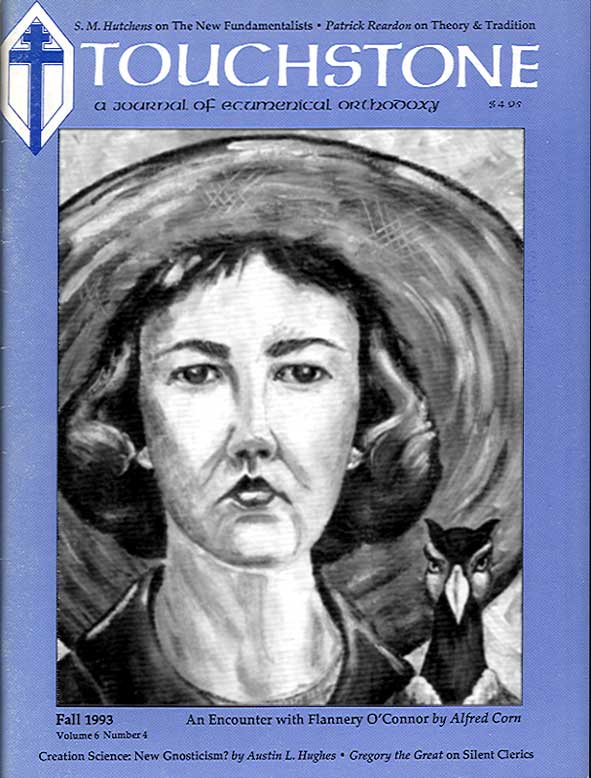The Reforging of “Fundamentalism”
by S. M. Hutchens
In the Easter 1991 issue of The Anglican Digest, a priest of the Episcopal Church holds forth on “The Dangers of Fundamentalism.” Likening the fundamentalist to the Nazi, he consigns them both to perdition along with other “hidden things of darkness.” Fundamentalism, he tells his readers, is passionate ignorance claming to own the whole truth. It is Ian Paisley screaming at Anglican peacemakers, Jimmy Swaggart confusing AIDS with God’s vengeance for sin, and the militant stupidity that censures professors of religion for a little harmless speculation. True Anglicanism, says the priest, is bound to tell people who sit in this kind of darkness, diminished and immobilized by fundamentalism, about the “true light, which lighteth every one that cometh into the world.”
The distribution of ideological prophylactics has become as important in mainline Protestantism these days as it ever was among the fundamentalists themselves. The Anglican Digest diatribe brings to memory Harry Emerson Fosdick’s widely read 1922 sermon “Will the Fundamentalists Win?” when that question caused as much concern in the upper reaches of the Protestant establishment as it does again today. When the principalities that run the denominations sense that churchgoers are becoming weary of the credal and ethical chaos that has been visited on them from the institutional high places—weary enough to start looking over the fences for something a bit more recognizably Christian—the patronizing smile, the slighting allusion, and the officially approved study material demonstrating that true Christianity has always been progressive, no longer suffice to keep the fundamentalist peril at bay. Once again the larger rhetorical war engines must be hauled out to close minds against closed-mindedness. An old-style religion must not simply be depreciated but demonized.
But here is a puzzlement: while one expects anti-fundamentalists salvos coming in from the left, the Anglican Digest represents the tidiest and most respectable kind of Episcopalian traditionalism. Why should publications of this type (the Digest is not alone in the Anglican world) seem to have it in for fundamentalists? Aren’t fundamentalists a world—that is, a social class or two—apart from the Episcopalians? And why the pressing concern to attack fundamentalism among those who profess to be moderates or conservatives? Why does one hear so many who sigh for the good old days take pains to let it be known that they abjure fundamentalism and all its works?
There is no surprise here for those who know the Episcopal Church. “Fundamentalism” threatens not only the coalition of liberals, feminists, and sundry political correctors who have captured its power structures, but also the demure traditionalists who quake chastely at the thought of violation by any kind of enthusiasm. To these the fundamentalist of chief concern is not the Baptist or Pentecostal safely on the other side of the ecclesiastical tracks, but the charismatic, evangelical, or similarly convinced member of his own fellowship who threatens to disturb the increasingly mausoleum-like peace of conventional Episcopalianism—to hug him before the offertory, to fill his quietly dying church with the unwelcome tumult of life, or, (quite unforgivably) to insist that what is happening to the Church these days is actually something to cause a commotion about. Despite their numerous antipathies, the modernist and the brittle traditionalist stand firmly united against the noisy barbarians massed on their common frontier. The fear of fundamentalism is upon them all, now more than ever.
Traditionalist Christians of the non-hugging variety should, however, be cautious about slinging the epithet about these days lest they find themselves pierced by their own dart. The definition of “fundamentalist” is being enlarged to include them. I am not referring here to its crass deployment to tar over anyone, Muslims or Methodist, who dares to offend the gods of inclusivism by insisting that truth excludes as well, but to its expansion within the churches themselves as a loosely defined term of reproach for anyone who takes issue with religious modernism on the grounds that it isn’t Christian. The cultured conservative who endorses the historic confession of his church but would prefer to put as much distance as possible between himself and the shabbier neighborhoods of Christendom needs to be told that the luxury of doing both is quickly evaporating. The days when a Michael Ramsey could rumble about the “menace of fundamentalism” are passing when an increasing number of his fellow bishops are using the word to describe anyone who believes the Creed and keeps to his own bed.
II.
One can hardly find a better example of the reforging of the term than in John Shelby Spong’s Rescuing the Bible from Fundamentalism: A Bishop Rethinks the Meaning of Scripture. The uninitiated (including non-Christians who thought they knew what Christians believed) may find this book shocking, but those who have been around a bit will recognize it simply as a short course in Bible as taught at the typical seminary, for it is, alas, what is believed about the Bible by the typical seminary professor these days. In the upper ranges of the mainline Protestant religious establishment (and increasingly, it appears, among Roman Catholic teachers of religion as well) there is nothing extraordinary about Bishop Spong’s opinions. He is still a member of his denomination’s House of Bishops in perfectly good standing, not having been censured, much less deposed, for the kind of opinions we will encounter below. What is stunning about Rescuing the Bible is its remarkable boldness in spilling the beans for popular consumption, sans the culinary art of the liberal pulpit, and outside the oldline schools of religion, with their unique facilities for making Christian postulants into agnostic social workers.
The bishop’s positive objective is to inform his readers that the Bible, while it cannot be read with the naïve credulity of the pre-critical—that is, the fundamentalist—mind, is still an immensely useful book. It is, in fact, a downright wonderful book, if approached intelligently. He is terribly fond of the Bible, knows it well, and so is all the more interested in rescuing its readers “from the clutches of a mindless literalism” that characterized the faith of his Baptist mother, whose religion was obviously less expansive than his own.
The word of God in scripture confronts me with the revelation that all human beings are created in God’s image. . . . all human beings. Men and women, homosexual persons and heterosexual persons, all races . . . —all persons reflect the holiness of God, for all are made in God’s image. How can I enslave, segregate, denigrate, oppress, violate, or victimize one who bears the image of the Holy One? That is the Word of God I meet in the Bible, [p.248]
An old-fashioned Christian of the “mindless” variety, when confronted with the warm, inclusive stew served up by Bishop Spong, can confidently be expected to have a serious attack of jerking knees. He will wish to discriminate between the ingredients of this motley pottage, to distinguish, for example, between innocent differences of race and gender and those stemming from corruption and error, between blind prejudice and frank recognition of diversity. In his bucolic simplicity the “literalist” may be expected to affirm that the bishop is right about everybody being made in God’s image, but wrong in thinking that this makes everyone acceptable to God, whatever he may believe or do. He will persist in theological nit-picking, asking the bishop if he actually believes, as he seems to imply, that the homosexual’s homosexuality is, like his humanity, derived from the divine image. The mindless literalist will, in short, insist on exhuming the whole encyclopedia of an obsolete orthodoxy and the myths upon which it is based, compulsively dividing light from darkness as befits his reactionary obsession. Mindlessness is a terrible handicap for those who insist on complicating things so much.
S. M. Hutchens is a senior editor and longtime writer for Touchstone.
bulk subscriptions
Order Touchstone subscriptions in bulk and save $10 per sub! Each subscription includes 6 issues of Touchstone plus full online access to touchstonemag.com—including archives, videos, and pdf downloads of recent issues for only $29.95 each! Great for churches or study groups.
Transactions will be processed on a secure server.
more from the online archives
calling all readers
Please Donate
"There are magazines worth reading but few worth saving . . . Touchstone is just such a magazine."
—Alice von Hildebrand
"Here we do not concede one square millimeter of territory to falsehood, folly, contemporary sentimentality, or fashion. We speak the truth, and let God be our judge. . . . Touchstone is the one committedly Christian conservative journal."
—Anthony Esolen, Touchstone senior editor











